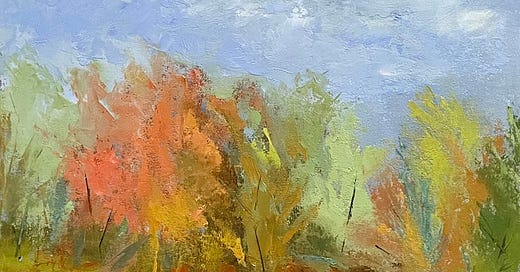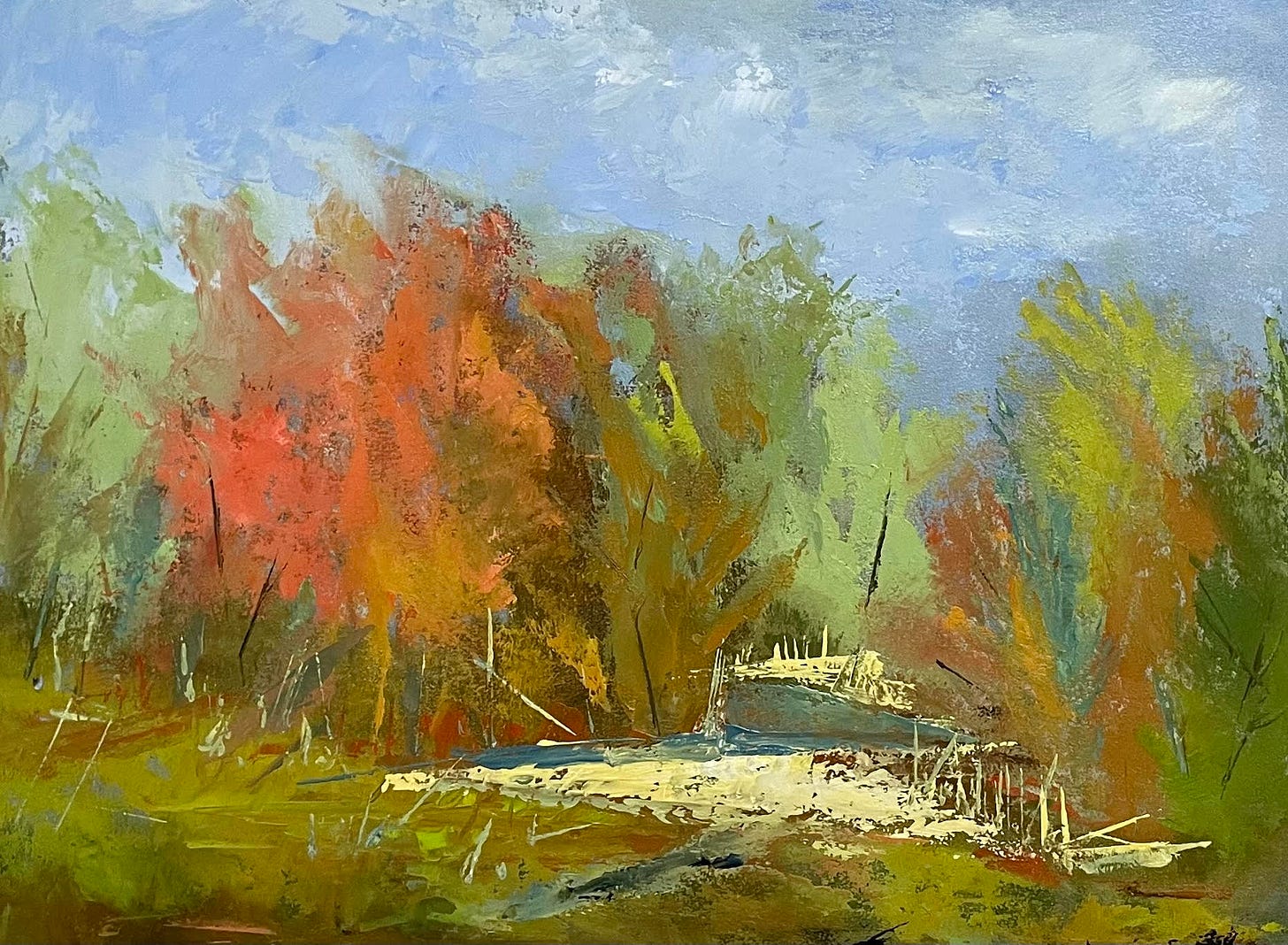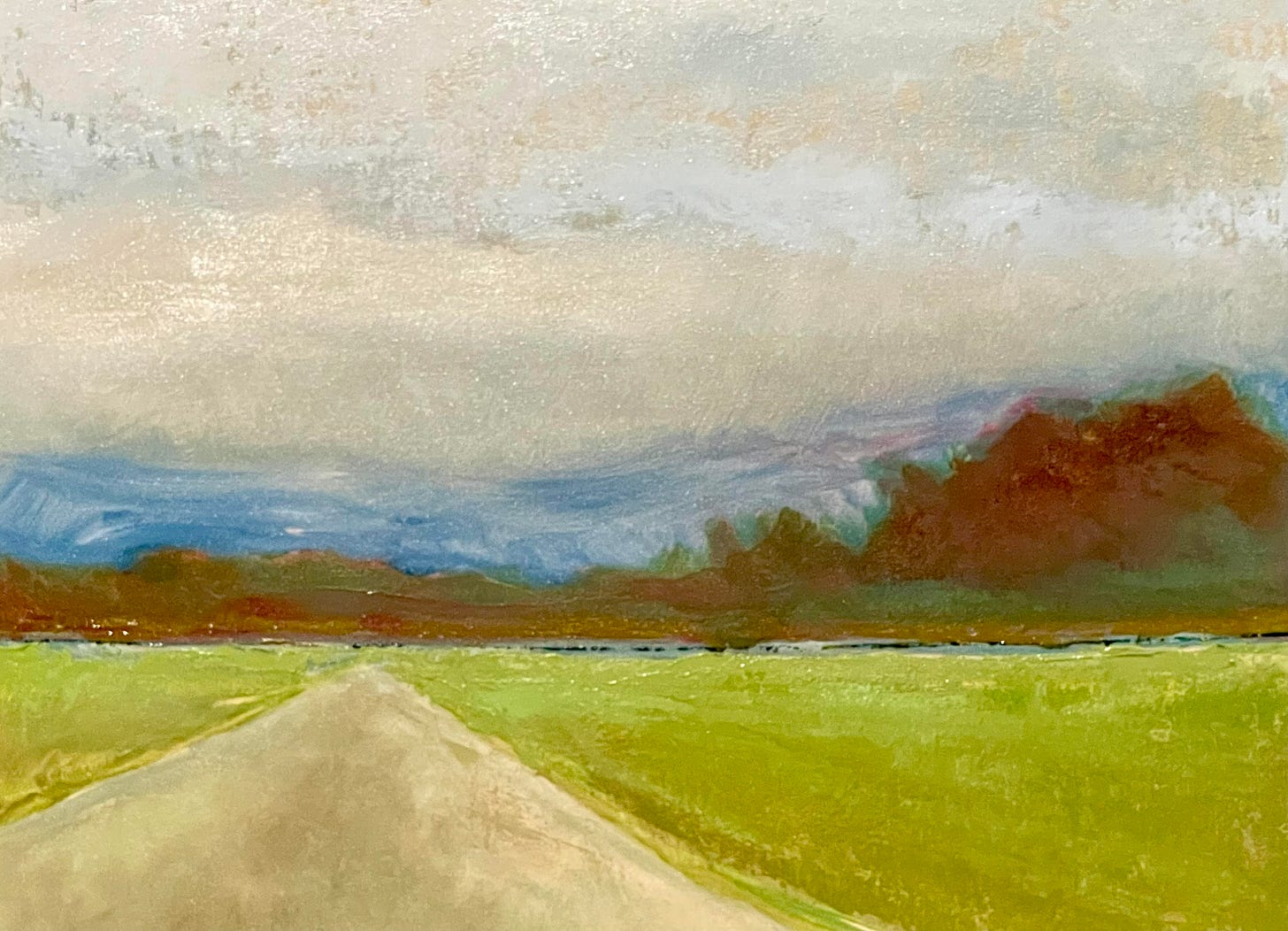I have been working with a palette knife instead of brushes. More and more I am finding that the texture, and the feel of spreading paint on a firm surface with my knife is natural to me. Maybe it is my background in clay that makes me want to sculpt my paintings.
I am trying to follow the advice of many sage painters, to paint shapes, not things. I would add to this, that I try to follow light more than color, although of course color is how light is expressed.
It makes me feel more appropriately related to the wonder of our natural world when I don’t try to duplicate it, but rather, sing with it. My shapes are my feelings, my colors, the nuances.
In the painting above, based on my yard and it’s sloping hill (covering the septic field) and my Japanese maples, I tried to share the feeling that I have looking out from my studio in the morning. Before long, of course, fantasy takes the lead, and my palette knife leaves the slope of the yard for the slope of my mind. At first I was somewhat satisfied with this painting, but when I woke up and stumbled to the studio with coffee and dog, I felt there was no where in the painting to rest. No transcendence, I thought. It cannot be complete without a place to rest.
It is not clear that the second version, with the addition of light and perhaps a hint at a body of water, is any better. Nevertheless, I feel better when I look at it.
I’ve often noticed how a single bench in an image, even with no one on it (maybe even better that no one is on it) seems to give the viewer the feeling that there is a place for him. We are bodily beings; we live in space and time. It is necessary that we have a resting place. It is even more necessary that we find a way to be at peace with our finite selves. Our desires and our lives are incommensurate. Young people are often told that they can be anything and do anything that they want if they really try. What a false and possibly damaging suggestion! If it were true, wouldn’t more people be trying so much harder? It might be that we want to believe this, but the challenge of youth is not only to find a calling, but to face being tested. Being tested includes the possibility of failure.
So what does it mean to be at peace with our finite selves? Where is the place to rest our weary souls? Part of the answer to this, by necessity, is that we must attain peace even when things don’t go our way. Is there an insight or teaching that can facilitate the discovery of a peace that remains despite the roller coaster of our lives? I would say yes, that resting place exists, although one probably shouldn’t call it a place, since it is not spacial.
This is one of the many paradoxes that can be resolved through insight. Although we live our lives in space and time, it is also true that we transcend space and time. Awareness is not spacial-temporal even as the one who is aware is. Think of a musical composition. The hearer notices the different notes, but simultaneously hears the theme. The theme is both expressed in the note and transcends the note. The hearer knows both. The single note is not the theme, but the theme cannot be heard without the notes.
Or consider memory, fallible though it may be. As an adult, you walk into your childhood bedroom. Briefly, you may even be that child again. Emotions arise that temporarily obscure your adult emotions. You see the toy that excited you in childhood and the memory of play infuses your being. And yet, you are in an entirely different time of life. Housed strangely within your awareness are the ways of seeing of both the child and the adult. If “clock time” is cast aside, the phenomenology of your experience includes two time periods easily.
Spiritual teachers advise that you “rest in awareness.” The notion that you are the driver of your life is revealed as illusory when you permit yourself to be true to your actual experience. Are you living, or being lived?
My teacher used to counsel us not to simply re-double our efforts. What he meant by this, I believe, is that when faced with a challenge, one’s inclination is to work even harder. But if our difficulty can be seen to be part and parcel of our solution, re-doubling our efforts is fruitless.
Let me give you an example. Imagine that when faced with difficulty, a person avoids through procrastination. Ordinarily, for most of us, we eventually take on the difficulty, after some procrastination. But sometimes, instead, a person continues to avoid, and then avoids the consequences of avoiding with more avoidance. I have seen extreme cases of this. One woman avoided repair to her home until she no longer had running water. She solved this, not by acting to protect the viability of her property, but by using a gym to shower, and her yard as a bathroom. She redoubled her effort, but it was a wrong headed effort. In fact, the efforts she made, in the form of procrastination, created more problems of the sort she wanted to avoid.
Another classic example, probably a familiar one, can be found in relationships. A woman wants to talk to her husband about her day. She is looking to describe her various challenges. Her husband responds by making suggestions. They are soon in an argument because the woman isn’t feeling listened to, and the man is frustrated that she is so unreceptive to his help. Can she really want to continue in this fruitless way? he wonders. His misfortune is that he misunderstands what she is asking of him. Each time she wants to be compassionately heard, he replies with an innovative suggestion. When frustrated that she doesn’t appreciate his efforts on her behalf, the husband ends up feeling like a sounding board to her complaints and she ends up feeling that she is speaking to a brick wall. In how many kitchens across the country is this drama re-enacted daily? (As a possible solution, if the husband were to ask the wife questions about her efforts and her hopes for those efforts, he might see a different result, and actually help her. She might be able to come up with a new solution on her own, aided by inquiry.)
The trajectory of being oneself has a predictable end. As a final example, take the case of redoubling one’s effort to “be good.” I’ve seen many people stay in relationships or work environments for way too long using the strategy of being good. To each offense, each challenge, they respond by being even kinder, or working harder, or being even more sincere. Redoubling an effort of this sort will work well with someone who values these traits, but not at all with the person who doesn’t care or sees others merely as functions. Passive resistance worked with the British, but it never would have worked with the Nazis.
Our question was where is the place of repose? My teacher used to offer an example of a boy who dreams he is on fire. The boy is crying out in his sleep, terrified. The question to us was do you throw water on him or wake him up? The answer, of course, is you wake him up.
Imagine that you let go of the forward facing movement of your life. You drop the effort to be whatever it is that you are trying to be. As your efforts drop away, you stand at the edge of a vast vista. No work needs to be done-you simply open yourself to the beauty of this vista. Now, you find that your days continue, but without the sense of effort. You do nothing to try to make things happen, even as you continue with your tasks and doings. The entirety of your frenetic energies are completely dissolved. Gone the urgencies and the fears, self-recriminations and shame. You had thought, without thinking it exactly, that all those churning feelings and thoughts were necessary to function. But now you discover, to your surprise, that they are not. It all continues, but instead of trying to make it happen, you simply notice that it does happen-accompanied by a sense of awe.
I’ll never forget a school play I saw in childhood. The play was about a people who believed that the sun would only rise if they conducted elaborate ceremonies each morning before dawn. One morning, for some reason, they were unable to conduct their rituals. Waiting in dread for the world to end, to their astonishment, they were greeted by a rising sun that cast light on everything. In the face of such effervescence the peoples’ gratitude could only expand and expand.






